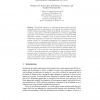Free Online Productivity Tools
i2Speak
i2Symbol
i2OCR
iTex2Img
iWeb2Print
iWeb2Shot
i2Type
iPdf2Split
iPdf2Merge
i2Bopomofo
i2Arabic
i2Style
i2Image
i2PDF
iLatex2Rtf
Sci2ools
116
click to vote
MABS
2004
Springer
2004
Springer
Distributed Simulation of MAS
The efficient simulation of multi-agent systems presents particular challenges which are not addressed by current parallel discrete event simulation (PDES) models and techniques. While the modelling and simulation of agents, at least at a coarse grain, is relatively straightforward, it is harder to apply PDES approaches to the simulation of the agents’ environment. In conventional PDES approaches a system is modelled as a set of logical processes (LPs). Each LP maintains its own portion of the state of the simulation and interacts with a small number of other LPs. The interaction between the LPs is assumed to be known in advance and does not change during the simulation. In contrast, the environment of a MAS is read and updated by agent and environment LPs in ways which depend on the evolution of the simulation. As a result, MAS simulations typically have a large shared state which is not associated with any particular agent or environment LP. In [1] we proposed a new approach to th...
Related Content
| Added | 02 Jul 2010 |
| Updated | 02 Jul 2010 |
| Type | Conference |
| Year | 2004 |
| Where | MABS |
| Authors | Michael Lees, Brian Logan, Rob Minson, Ton Oguara, Georgios K. Theodoropoulos |
Comments (0)

